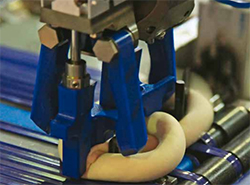Component parts that come into contact with food and drink in production processes need to be clean, safe and resistant. Engineering plastics in food-grade quality of the kind offered by Licharz meet the EU standards for food conformity in line with framework regulation 1935/2004 and regulation EU/10/2011. So why do we still see the need for action?
EU/10/2011 – An incomplete regulation
EU/10/2011 is an individual measure regulating the conditions that materials and objects must fulfill if they come into contact with food and drink. The regulation defines migration limits in order to prevent a hazard to health. However, EU/10/2011 only defines very general methods of conducting migration measurements. It does not refer to EN 1186 from 2002, for example, which regulates the performance of migration tests. Originally adapted for plastics for the purposes of packaging regulations, a range of corresponding standard tests and scenarios became established. Total migration, for example, is often measured after a material comes into contact with a foodstuff simulant at 40 °C over 10 days. This does not even come close to the conditions that engineering plastics are subjected to during food and drink production. Under the given conditions, the permitted limit can be exceeded and must then be scaled down to the actual application using a series of formulas. We would like to change this and achieve a practical solution that both conforms to the existing regulation EU/10/2011 and reflects actual conditions.
Migration testing for the real world
"We need to define standardized methods for determining plastics migration in machines used to produce food and drink", says Stefan Klein, compliance officer at Licharz GmbH. Klein represents Licharz and the plastics industry association EPSM (Engineering Polymer Shapes for Machining) on a working group of the FREP (Food Contact Regulatory Experts Panel) within the EuPC. It is due to begin work in December. The aim is to define a guideline for migration tests for engineering plastics in the food and drink industry. Licharz has been dealing with the plastic materials regulation since 2004. Stefan Klein is looking forward to adding his suggestions to the working group’s discussion. "We will do our bit to come to a reasonable solution that ensures verifiable safety for customers in the food and drink industry", says Klein. The recommendation from Licharz is clear: Get it right.


